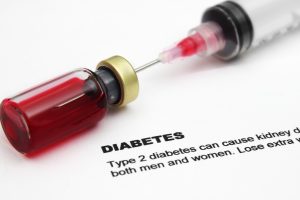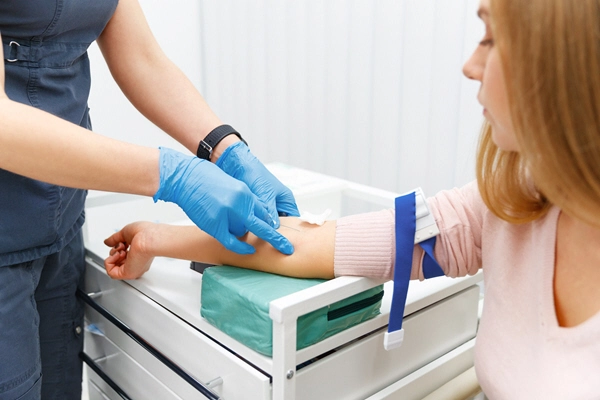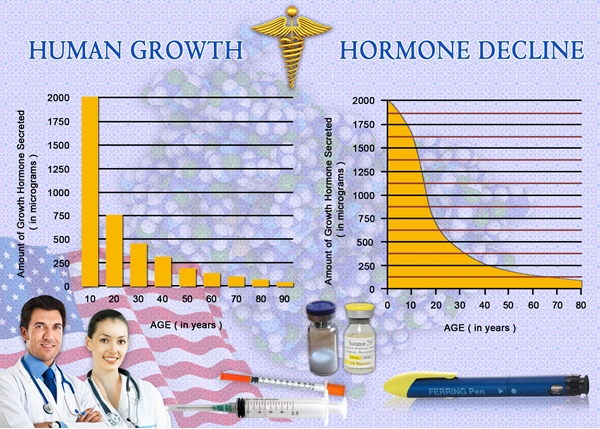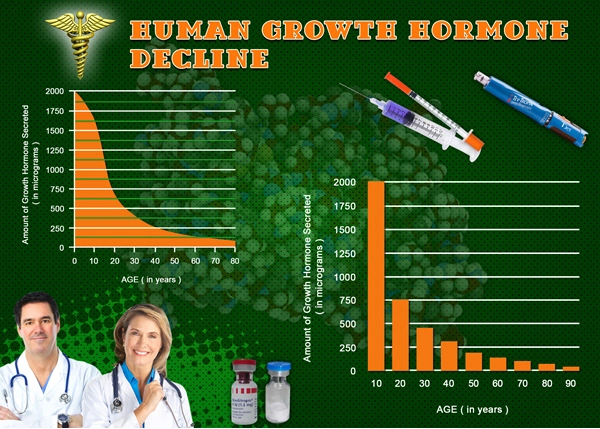 Two of the most critical metabolic hormones that your body produces are Insulin and Growth Hormone. Insulin is secreted by the pancreas and is used to transport glucose to cells for use as energy.
Two of the most critical metabolic hormones that your body produces are Insulin and Growth Hormone. Insulin is secreted by the pancreas and is used to transport glucose to cells for use as energy.
Glucose is just the scientific term for blood sugar. If you're busy and active, most glucose is conveyed to provide power for your activity.
Any glucose that is left over is sent to adipose fat cells for storage. While body fat is important for other purposes, in this context, adipose tissue is best thought of as a means of energy storage. Body fat also plays a major role in insulation and hormone production.
Video Link: https://vimeo.com/556466560
Video Download: The Importance Of Balanced Growth Hormone And Insulin Levels
Video Stream: The Importance Of Balanced Growth Hormone And Insulin Levels
Human Growth Hormone is also multifaceted, though its uses are primarily concerned with cellular metabolism. During development, our bodies produce large amounts of Human Growth Hormone to facilitate growth.
When children have Growth Hormone Deficiency, they fail to reach the height and size of their peers. After puberty, surging HGH Levels abate, and Growth Hormone Production falls to a level that encourages optimal wellness without leading to further growth.
Insulin and Growth Hormone Work Together to Provide Energy
In many ways, HGH works in counterbalance to Insulin. Insulin is integral to the storage of fat, whereas Human Growth Hormone helps release the energy captured in fat. When calories from the diet are readily available, the body will put those calories to use.
In between meals, or when activity levels exceed available free energy, the body releases HGH as a means to release the energy stored as body fat. Growth Hormone and Insulin work together to make sure that the body has energy available at all times.
While Growth Hormone and Insulin work opposite one another with regard to blood sugar and body fat, they work together to provide energy to the muscles. Both Insulin and HGH provide the proteins in muscle with the fuel for activity.
Obesity Represents Imbalance of Growth Hormone and Insulin
When the two hormones are in ideal balance, energy needs are met, and body fat is relatively low. Obesity represents a situation where the balance between Growth Hormone and Insulin becomes out of balance.
One of the hormonal characteristics of Obesity is that Insulin Levels are elevated, and Growth Hormone Production is suppressed. This creates a problematic cycle that makes it harder to get rid of accumulated fat. Also, studies have shown that highly active people produce more Growth Hormone and Less Insulin.
Furthermore, the increased insulin levels associated with Obesity also increase the risk of Insulin Resistance, which is the precursor to diabetes.
Researchers hypothesize that measuring the ratio of Growth Hormone to Insulin may help doctors predict a patient's future risk of Obesity. If studies confirm this hypothesis, then it may be possible to modify hormone levels to help prevent the onset of Obesity.

- Human Growth Hormone Injections In Cheyenne [Last Updated On: May 25th, 2025] [Originally Added On: October 19th, 2018]
- Human Growth Hormone Injections In Madison [Last Updated On: May 31st, 2025] [Originally Added On: October 19th, 2018]
- Human Growth Hormone Injections In Vancouver [Last Updated On: February 24th, 2025] [Originally Added On: October 19th, 2018]
- Human Growth Hormone Injections In Tacoma [Last Updated On: February 25th, 2025] [Originally Added On: October 19th, 2018]
- Human Growth Hormone Injections In Spokane [Last Updated On: February 26th, 2025] [Originally Added On: October 19th, 2018]
- Human Growth Hormone Injections In Bellevue [Last Updated On: February 26th, 2025] [Originally Added On: October 19th, 2018]
- Human Growth Hormone Injections In Richmond [Last Updated On: May 31st, 2025] [Originally Added On: October 19th, 2018]
- Human Growth Hormone Injections In Portsmouth [Last Updated On: June 1st, 2025] [Originally Added On: October 19th, 2018]
- Human Growth Hormone Injections In Norfolk [Last Updated On: June 1st, 2025] [Originally Added On: October 19th, 2018]
- Human Growth Hormone Injections In Hampton [Last Updated On: March 27th, 2025] [Originally Added On: October 19th, 2018]
- Human Growth Hormone Injections In Chesapeake [Last Updated On: March 27th, 2025] [Originally Added On: October 19th, 2018]
- Human Growth Hormone Injections In Alexandria [Last Updated On: March 28th, 2025] [Originally Added On: October 19th, 2018]
- Human Growth Hormone Injections In Montpelier [Last Updated On: June 2nd, 2025] [Originally Added On: October 19th, 2018]
- Human Growth Hormone Injections In Provo [Last Updated On: June 2nd, 2025] [Originally Added On: October 19th, 2018]
- Human Growth Hormone Injections In Waco [Last Updated On: June 7th, 2025] [Originally Added On: October 19th, 2018]
- Human Growth Hormone Injections In Richardson [Last Updated On: June 5th, 2025] [Originally Added On: October 19th, 2018]
- Human Growth Hormone Injections In Plano [Last Updated On: June 6th, 2025] [Originally Added On: October 19th, 2018]
- Human Growth Hormone Injections In Pasadena [Last Updated On: June 4th, 2025] [Originally Added On: October 19th, 2018]
- Human Growth Hormone Injections In Midland [Last Updated On: June 7th, 2025] [Originally Added On: October 19th, 2018]
- Human Growth Hormone Injections In Mesquite [Last Updated On: June 4th, 2025] [Originally Added On: October 19th, 2018]
- Human Growth Hormone Injections In McKinney [Last Updated On: June 3rd, 2025] [Originally Added On: October 19th, 2018]
- Human Growth Hormone Injections In McAllen [Last Updated On: June 8th, 2025] [Originally Added On: October 19th, 2018]
- Human Growth Hormone Injections In Lubbock [Last Updated On: June 6th, 2025] [Originally Added On: October 19th, 2018]
- Human Growth Hormone Injections In Lewisville [Last Updated On: June 5th, 2025] [Originally Added On: October 20th, 2018]
- Human Growth Hormone Injections In Laredo [Last Updated On: June 3rd, 2025] [Originally Added On: October 20th, 2018]
- Human Growth Hormone Injections In Killeen [Last Updated On: February 18th, 2025] [Originally Added On: October 20th, 2018]
- Human Growth Hormone Injections In Irving [Last Updated On: February 19th, 2025] [Originally Added On: October 20th, 2018]
- Human Growth Hormone Injections In Garland [Last Updated On: February 20th, 2025] [Originally Added On: October 20th, 2018]
- Human Growth Hormone Injections In Denton [Last Updated On: February 21st, 2025] [Originally Added On: October 20th, 2018]
- Human Growth Hormone Injections In Carrollton [Last Updated On: June 8th, 2025] [Originally Added On: October 20th, 2018]
- Human Growth Hormone Injections In Brownsville [Last Updated On: February 21st, 2025] [Originally Added On: October 20th, 2018]
- Human Growth Hormone Injections In Beaumont [Last Updated On: February 18th, 2025] [Originally Added On: October 20th, 2018]
- Human Growth Hormone Injections In Austin [Last Updated On: February 22nd, 2025] [Originally Added On: October 20th, 2018]
- Human Growth Hormone Injections In Arlington [Last Updated On: February 20th, 2025] [Originally Added On: October 20th, 2018]
- Human Growth Hormone Injections In Amarillo [Last Updated On: February 19th, 2025] [Originally Added On: October 20th, 2018]
- Human Growth Hormone Injections In Abilene [Last Updated On: February 22nd, 2025] [Originally Added On: October 20th, 2018]
- Human Growth Hormone Injections In Nashville [Last Updated On: February 27th, 2025] [Originally Added On: October 20th, 2018]
- Human Growth Hormone Injections In Murfreesboro [Last Updated On: February 27th, 2025] [Originally Added On: October 20th, 2018]
- Human Growth Hormone Injections In Memphis [Last Updated On: February 28th, 2025] [Originally Added On: October 20th, 2018]
- Human Growth Hormone Injections In Knoxville [Last Updated On: February 28th, 2025] [Originally Added On: October 20th, 2018]
- Human Growth Hormone Injections In Clarksville [Last Updated On: March 1st, 2025] [Originally Added On: October 20th, 2018]
- Human Growth Hormone Injections In Chattanooga [Last Updated On: March 1st, 2025] [Originally Added On: October 20th, 2018]
- Human Growth Hormone Injections In Erie [Last Updated On: March 29th, 2025] [Originally Added On: October 20th, 2018]
- Human Growth Hormone Injections In Allentown [Last Updated On: March 28th, 2025] [Originally Added On: October 20th, 2018]
- Human Growth Hormone Injections In Salem [Last Updated On: March 2nd, 2025] [Originally Added On: October 20th, 2018]
- Human Growth Hormone Injections In Portland [Last Updated On: March 2nd, 2025] [Originally Added On: October 20th, 2018]
- Human Growth Hormone Injections In Gresham [Last Updated On: March 3rd, 2025] [Originally Added On: October 20th, 2018]
- Human Growth Hormone Injections In Eugene [Last Updated On: March 3rd, 2025] [Originally Added On: October 20th, 2018]
- Human Growth Hormone Injections In Tulsa [Last Updated On: March 4th, 2025] [Originally Added On: October 20th, 2018]
- Human Growth Hormone Injections In Norman [Last Updated On: March 4th, 2025] [Originally Added On: October 20th, 2018]
- Human Growth Hormone Injections In Toledo [Last Updated On: May 27th, 2025] [Originally Added On: October 20th, 2018]
- Human Growth Hormone Injections In Dayton [Last Updated On: May 29th, 2025] [Originally Added On: October 20th, 2018]
- Human Growth Hormone Injections In Columbus [Last Updated On: May 29th, 2025] [Originally Added On: October 20th, 2018]
- Human Growth Hormone Injections In Akron [Last Updated On: May 30th, 2025] [Originally Added On: October 20th, 2018]
- Human Growth Hormone Injections In Paterson [Last Updated On: February 23rd, 2025] [Originally Added On: October 20th, 2018]
- Human Growth Hormone Injections In Reno [Last Updated On: February 24th, 2025] [Originally Added On: October 20th, 2018]
- Human Growth Hormone Injections In Henderson [Last Updated On: February 25th, 2025] [Originally Added On: October 20th, 2018]
- Human Growth Hormone Injections In Omaha [Last Updated On: May 26th, 2025] [Originally Added On: October 20th, 2018]
- Human Growth Hormone Injections In Lincoln [Last Updated On: May 26th, 2025] [Originally Added On: October 20th, 2018]
- Human Growth Hormone Injections In Billings [Last Updated On: May 27th, 2025] [Originally Added On: October 20th, 2018]
- Human Growth Hormone Injections In Springfield [Last Updated On: May 28th, 2025] [Originally Added On: October 20th, 2018]
- Human Growth Hormone Injections In Independence [Last Updated On: June 9th, 2025] [Originally Added On: October 20th, 2018]
- Human Growth Hormone Injections In Columbia [Last Updated On: May 28th, 2025] [Originally Added On: October 20th, 2018]
- Human Growth Hormone Injections In Jackson [Last Updated On: May 30th, 2025] [Originally Added On: October 20th, 2018]
- Human Growth Hormone Injections In Rochester [Last Updated On: February 23rd, 2025] [Originally Added On: October 20th, 2018]
- Human Growth Hormone Injections In Warren [Last Updated On: March 5th, 2025] [Originally Added On: October 20th, 2018]
- Human Growth Hormone Injections In Lansing [Last Updated On: March 5th, 2025] [Originally Added On: October 20th, 2018]
- Human Growth Hormone Injections In Flint [Last Updated On: March 6th, 2025] [Originally Added On: October 20th, 2018]
- Human Growth Hormone Injections In Worcester [Last Updated On: March 29th, 2025] [Originally Added On: October 20th, 2018]
- Human Growth Hormone Injections In Springfield [Last Updated On: March 30th, 2025] [Originally Added On: October 20th, 2018]
- Human Growth Hormone Injections In Lowell [Last Updated On: March 30th, 2025] [Originally Added On: October 20th, 2018]
- Human Growth Hormone Injections In Cambridge [Last Updated On: March 31st, 2025] [Originally Added On: October 20th, 2018]
- Human Growth Hormone Injections In Augusta [Last Updated On: March 6th, 2025] [Originally Added On: October 20th, 2018]
- Human Growth Hormone Injections In Shreveport [Last Updated On: March 7th, 2025] [Originally Added On: October 20th, 2018]
- Human Growth Hormone Injections In Lafayette [Last Updated On: March 7th, 2025] [Originally Added On: October 20th, 2018]
- Human Growth Hormone Injections In Louisville [Last Updated On: March 8th, 2025] [Originally Added On: October 20th, 2018]
- Human Growth Hormone Injections In Lexington [Last Updated On: March 8th, 2025] [Originally Added On: October 20th, 2018]
- Human Growth Hormone Injections In Wichita [Last Updated On: March 9th, 2025] [Originally Added On: October 20th, 2018]
- Human Growth Hormone Injections In Topeka [Last Updated On: March 9th, 2025] [Originally Added On: October 20th, 2018]
- Human Growth Hormone Injections In Olathe [Last Updated On: March 10th, 2025] [Originally Added On: October 20th, 2018]



List of USA state clinics - click a flag below for blood testing clinics.
Word Count: 483


















































